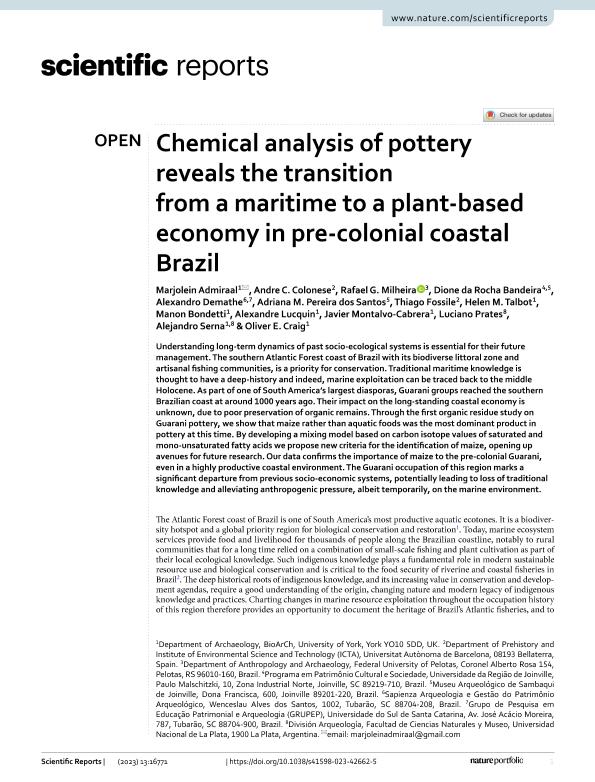Artículo
Chemical analysis of pottery reveals the transition from a maritime to a plant-based economy in pre-colonial coastal Brazil
Admiraal, Marjolein; Colonese, Andre C.; Milheira, Rafael G.; da Rocha Bandeira, Dione; Demathe, Alexandro; Pereira dos Santos, Adriana M.; Fossile, Thiago; Talbot, Helen M.; Bondetti, Manon; Lucquin, Alexandre; Montalvo Cabrera, Javier; Prates, Luciano Raúl ; Serna, Alejandro
; Serna, Alejandro ; Craig, Oliver E.
; Craig, Oliver E.
 ; Serna, Alejandro
; Serna, Alejandro ; Craig, Oliver E.
; Craig, Oliver E.
Fecha de publicación:
12/2023
Editorial:
Nature
Revista:
Scientific Reports
ISSN:
2045-2322
Idioma:
Inglés
Tipo de recurso:
Artículo publicado
Clasificación temática:
Resumen
Understanding long-term dynamics of past socio-ecological systems is essential for their future management. The southern Atlantic Forest coast of Brazil with its biodiverse littoral zone and artisanal fishing communities, is a priority for conservation. Traditional maritime knowledge is thought to have a deep-history and indeed, marine exploitation can be traced back to the middle Holocene. As part of one of South America’s largest diasporas, Guarani groups reached the southern Brazilian coast at around 1000 years ago. Their impact on the long-standing coastal economy is unknown, due to poor preservation of organic remains. Through the first organic residue study on Guarani pottery, we show that maize rather than aquatic foods was the most dominant product in pottery at this time. By developing a mixing model based on carbon isotope values of saturated and mono-unsaturated fatty acids we propose new criteria for the identification of maize, opening up avenues for future research. Our data confirms the importance of maize to the pre-colonial Guarani, even in a highly productive coastal environment. The Guarani occupation of this region marks a significant departure from previous socio-economic systems, potentially leading to loss of traditional knowledge and alleviating anthropogenic pressure, albeit temporarily, on the marine environment.
Palabras clave:
Change diet
,
South America
,
Maritime to plant
Archivos asociados
Licencia
Identificadores
Colecciones
Articulos(CCT - LA PLATA)
Articulos de CTRO.CIENTIFICO TECNOL.CONICET - LA PLATA
Articulos de CTRO.CIENTIFICO TECNOL.CONICET - LA PLATA
Citación
Admiraal, Marjolein; Colonese, Andre C.; Milheira, Rafael G.; da Rocha Bandeira, Dione; Demathe, Alexandro; et al.; Chemical analysis of pottery reveals the transition from a maritime to a plant-based economy in pre-colonial coastal Brazil; Nature; Scientific Reports; 13; 1; 12-2023; 1-9
Compartir
Altmétricas



